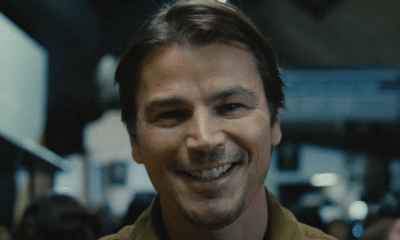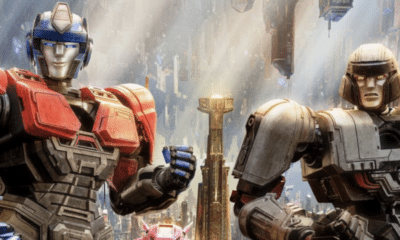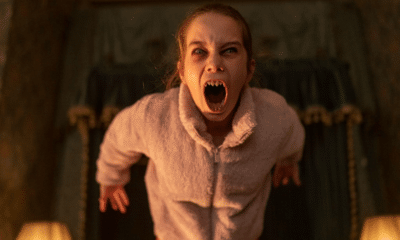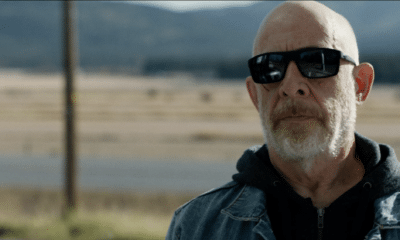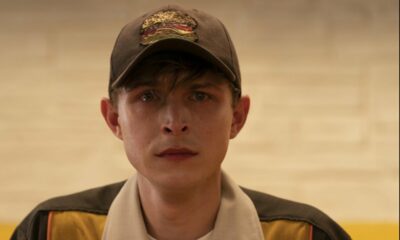
Credit: Nelson Bakerman
Larry Fessenden is one of the hardest working men in genre cinema. He runs his own production company Glass Eye Pix which has produced gems such as The Ranger, Most Beautiful Island, and Stake Land. But that isn’t all, Fessenden also works as an actor, appearing in films like You’re Next and We Are Still Here, a writer, being one half of the writing team on PS4 BAFTA winning game Until Dawn, and a director of films including Wendigo and Habit.
His latest project Depraved sees him equally busy as he works as director, writer, producer, and editor. The film is a modern retelling of Mary Shelley’s classic Frankenstein in which a young man Alex wakes up to find himself the brain in a reanimated creature known as Adam. Brought back to life by ex-forces medic Henry, Adam must learn to navigate the frightening world around him. Depraved gets its world premiere at What the Fest?! in New York and is sure to get people talking, it’s easily an equal to Shelley’s novel, and is simply brilliant. Given how much we enjoyed it, we were thrilled when we got to sit down with Larry ahead of the screening.
The film deals with parenthood. Being a new first-time mother, the film really resonated with me.
Well I’m the parent of one child, and I do believe it’s a very significant activity. I think a lot of my sensibilities were involved in that. It’s funny, a lot of my movies have that element in them. Before I had a kid, I made a movie about a seven year old and the family around him. It’s just somehow very important, the father figures around you. In my family, my parents are very sensible and kind and stayed together, so it wasn’t coming from drama. Maybe it was because I appreciated what it looks like. I see so many people who are racked with despair over their parents. You realise how intrusive the parent can be in the child’s forming. That was part of my thinking.
Depraved was filming during the 200th anniversary of the Frankenstein novel, what do you think it is about this story that still is so relevant?
Well it’s just an incredibly iconic story about a lot of important things. Of course the old eighteen hundred version is the question of playing God, and our technologies are getting away from us, and that’s still relevant today. Look at our communication technologies, they are actually causing tremendous harm. It’s a fantastic new object in our lives, but do we actually know how to handle it? I think there’s always that anxiety and that’s what a horror movie does, is express anxiety in a creative way.
Then there’s the idea of being an outsider. When you see the movie from the monster’s point of view, which is how I start the film, you realise how alienating life is. Waking up in someone else’s body, which is how we all sort of feel. Also the difference between the physical and the mental, and how they are very much related. That’s why I have so much brain imagery. I just try to remind everyone that we’re just physical creatures and yet we have these high aspirations towards art as represented in the museum, and towards lust as represented in the strip club. So all these things at once, and then we’re looking for direction and we turn to our father figures. In this case, they’re both narcissistic, damaged people. You realise what a soup life is, trying to negotiate all these different threads.

©Glass Eye Pix.
You’ve been working on the project for a few years, what took so long getting it made – were you waiting for that 200th Birthday?
No (chuckles), I wish I’d gotten it out a year before, it would have been more en vogue, now it’s almost passe. Look, you know there’s many ways to make a film. You usually have a script and then you try to get it in front of a famous actor who will generate financing. I think that Frankenstein seems a little low-brow in a lot of people’s minds and people weren’t able to commit. No actor would do the part, and these are tricks of fate and whatever; my reputation wasn’t enough to compel them and then admittedly I was raising a kid and I do have a stable of kids – people I work with, all the young filmmakers – and I try to produce their movies and that takes time. There’s a lot of things. Guillermo Del Toro says ‘the natural state of a film is not getting made’, that’s very profound. It’s a real struggle. People don’t understand. It a long time and actually eventually I just gave up on getting famous people. I had auditioned the monster and I really, really like Alex Breaux’ sensibility and we decided to build the movie ourselves. I used my small crew of people, Jenn Wexler, the producer whose worked for me for years. We made it the old-fashioned way, my way, which is sort of DIY.
Typically the Frankenstein films either hone in on the creature being the ‘monster’, or the doctor being the ‘monster’, but in Depraved the lines are much more blurred. Was that the hook that got you into the story initially?
Yes, I mean that’s my sensibility. I like to see what motivates the villain. I like to show that the hero isn’t really all good. That’s what I’ve done in all my films. It’s really just finding nuance and a sense of reality in characters. When you’re dealing with what I might just call a cliche like Frankenstein, or vampire movies, or anything of the horror tropes that I’m affectionate towards, I like to say, ‘well what would it really be like?’ ‘how would this really play?’ ‘let’s take away the cardboard cartoon character and let’s insert a real person.’ You’ll see their villainy or their vulnerability, but you have more to chew on and relate to. Therefore you bring the story alive again.

©Glass Eye Pix.
The creature design is really impressive. Being an indie film, it won’t have the same budget as a bigger film, how did you guys work to get that design?
Well naturally it was a priority. You can’t make a Frankenstein film without being aware of your predecessors. To some degree that was the most important thing in the movie after some sort of script was there. I worked with Brian Spears and Peter Gerner, my two pals who we’ve done movies together for over a decade. It’s funny, we didn’t really have as much time as we would like. Even though it took ten years to put together, I only decided to make the film in like a month long from start date.
We wanted to approach it realistically. We looked at pictures of war veterans. This is also coming from the world of the Iraq war and all the Middle East activities that we’ve been ensnared in. We wanted to evoke real wounds and not try to create a creature that looked like the beloved Karloff version. Someone who could walk amongst a crowd. I wanted to humanise the whole story and still have the glory of, there’s a number of references in the make-up to different designs over the years from Christopher Lee, to Karloff to the De Niro. That was also motivating us. Always with me, it’s form and content sort of playing off of each other.
As you mentioned there are little nods to previous versions of Frankenstein, but what does Alex bring to the role?
Well I had auditioned through a lot of people. Some would play him more like a monster, which is an understandable direction, but I really wanted to have… Alex was seen to be able to access a sense of confusion and trying very hard to connect. I think that gives a pathos to the role. The thing that was hard was we had to really track his development. It’s really a story of adolescence. You’re seeing a child grow from maybe a six year old to a twenty-five year old over the course of just two hours. We would very much say, ‘this is when he’s finding his teen years’, ‘now he’s interested in going out and meeting women and trying to understand what that is all about.’ Whereas in the beginning he’s quite content playing games. That was the really exciting thing is, to work with Alex to track the development. Then in the end he has to be angry, but I always wanted to insist, not just a display of rage, but also a resignation as to that the world is bad or is going to do him harm, and that’s how he reacts. These are all great things to discuss with an actor. You’re talking about philosophy and psychology, and Alex was up for all of it. That’s what makes for a great partnership in creating a character.

©Glass Eye Pix.
You worked on the film as writer, director, producer, editor, you have a little role in there – how do you manage all of those different jobs at once?
Well I find film making completely immersive and although I deeply, deeply believe in collaboration, I also tend to see it all as one job. I mean you can’t shoot a movie without thinking about the edit. Of course you can have someone sensible come in and tell you, ‘you don’t need this scene,’ or ‘this shot might go here’, and I’m not opposed to that. I had many helpers on the script. Many people gave notes and advice. The shape was always the same, but many things came out of it. Polidori used to be older, almost like a mentor / teacher figure, and that changed. That was a wonderful development. Lots of things like that. But it was always the same shape because I wanted this passing of the baton structure. From the kid who becomes the brain, to the monster, to the doctor, to Polidori, back to the beginning with the girl. A kind of book-end vibe. Some things stay the same, but it’s all very organic.
The colours of the movie, I would get colour swatches and talk to my production designer, ‘I want this look’, a lot of the props and objects are from my own house. I believe in this immersive three dimensional way of making movies. Especially when you’re making cheap film, part of the point is that this isn’t a corporate enterprise. This is actually very much from an individual. I do believe the cliche that the director is the last welcome dictator in the world. There is ONE vision, but everyone is welcome to participate. I also say that a good director steals from everybody from the set. Somebody has a good idea and you quickly make it your own (laughs), so it is a collaboration, but it’s a hierarchy.
And you even stole some of your cast from previous films that you’ve produced as well.
Oh absolutely! Chloe Levinë, Owen Campbell and Addison Timlin, all fantastic comrades from previous movies, and of course Josh Leonard has been in a Glass Eye film. So the whole gang, and the DP’s are from previous films, so it really was a family affair. I run my tiny, tiny, little company as a little community organisation so that’s how we put this movie together after ten years trying to get Hollywood to help me. That’s the reality of it all.

©Glass Eye Pix.
Stepping away from Depraved briefly, I have to ask if there are plans for any further games, or maybe even a film around Until Dawn?
A film? It’s funny you mention it. We actually tried to do that almost right out of the gate, and we had the blessing of everybody, but it didn’t happen so far. Graham [Reznic] and I are the writers, we work with Supermassive Games which made the game and they are fantastic. We actually made several subsequent games that don’t fit directly in the model. The newest one is coming out – Man of Medan. That’s the closest to Until Dawn you’ll find because it’s got a bunch of kids in a serious amount of trouble (laughs).
Netflix did the Black Mirror: Bandersnatch recently. There is an appetite for a chose your own adventure sort of film, so maybe now would be the time to push it back out there.
You’re right. In fact, I’m gonna get off the line and I’m gonna go pitch it! You’re absolutely right, that is a good reminder that we were going to make it a straight film, but maybe if we had a little more juice behind the pitch we could get a little further with it. That’s interesting. I tell you, making that game was the most popular I’ve ever felt (laughs), never mind Frankenstein, we love video games.
Are there any plans to bring Depraved onto the UK festival circuit?
I certainly hope so. That’s always the plan. I love going over across the pond even though you guys have to sort out your Brexit problems. But I would love to come over there and share it with everyone.
Frightfest turns twenty this year and that would be the perfect place to screen.
Tell Frightfest! (Laughs) Get all hands on deck!
Kat Hughes is a UK born film critic and interviewer who has a passion for horror films. An editor for THN, Kat is also a Rotten Tomatoes Approved Critic. She has bylines with Ghouls Magazine, Arrow Video, Film Stories, Certified Forgotten and FILMHOUNDS and has had essays published in home entertainment releases by Vinegar Syndrome and Second Sight. When not writing about horror, Kat hosts micro podcast Movies with Mummy along with her five-year-old daughter.

Latest Posts
-


Film Trailers
/ 15 hours agoM. Night Shyamalan’s ‘Trap’ trailer lands
Anew experience in the world of M. Night Shyamalan.
By Paul Heath -


Film News
/ 1 day agoFirst ‘Transformers One’ teaser trailer debuts IN SPACE!
The animated feature film is heading to cinemas this September.
By Paul Heath -


Film Reviews
/ 1 day ago‘Abigail’ review: Dirs. Matt Bettinelli-Olpin & Tyler Gillett (2024)
Matt Bettinelli-Olpin and Tyler Gillett direct this new horror/ heist hybrid.
By Awais Irfan -


Film Trailers
/ 1 day agoNew trailer for J.K. Simmons-led ‘You Can’t Run Forever’
A trailer has dropped for You Can’t Run Forever, a new thriller led by...
By Paul Heath
